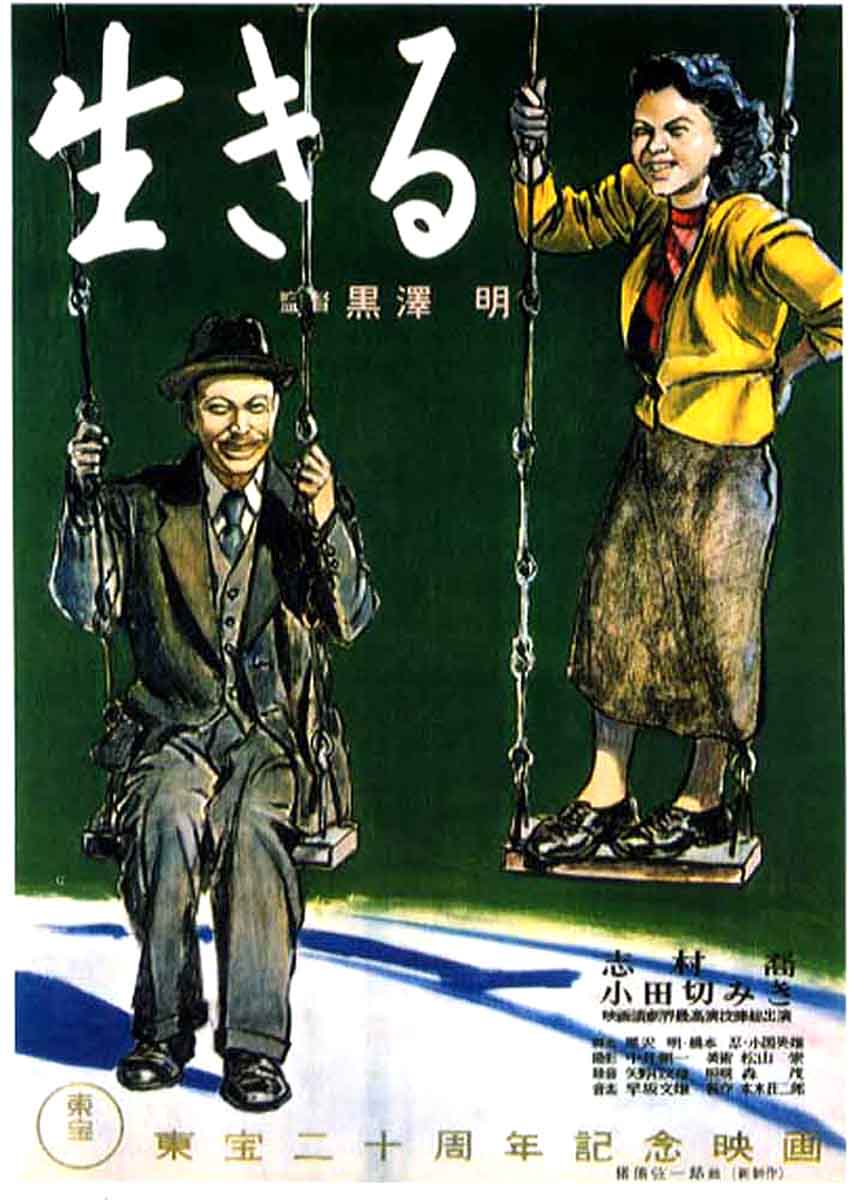- Ikiru
Infobox Film
name = Ikiru

caption = Original Japanese poster
director =Akira Kurosawa
producer =Sojiro Motoki
writer =Shinobu Hashimoto Akira Kurosawa Hideo Oguni
starring =Takashi Shimura
music =
cinematography =
editing =
distributor =Toho
released =October 9 ,1952
runtime = 143 minutes
country =Japan
language = Japanese
budget =
amg_id = 1:24340
imdb_id = 0044741 nihongo|"Ikiru"|生きる|"To Live" is a 1952 Japanese film written and directed by the acclaimedJapan ese filmmakerAkira Kurosawa . The film examines the struggles of aTokyo bureaucrat and his final quest for meaning.Plot
The movie stars
Takashi Shimura , who played in many of Kurosawa's films (most notably as the leader of the "Seven Samurai "), as Kanji Watanabe. Watanabe is a middle-aged man who has worked in the same monotonous bureaucratic position for decades. Furthermore, his relationship with his son has become strained, as his son and daughter-in-law seem to care mainly about his pension and their future inheritance.After learning he has
stomach cancer and has less than a year to live, Watanabe attempts to come to terms with his impending death. He plans to tell his son about the cancer, but decides against it when his son does not pay attention to him. He then tries to find escape in the pleasures of Tokyo's nightlife, but after one night, he realizes this is not the answer.Worth noticing in the night club scene is when Watanabe requests a song from the piano player. He sings this song, "
Gondola no Uta ", with great sadness. His singing greatly affects those watching him. The song is a ballad encouraging young women to find love while they are still young and beautiful, for life is short.The next day, a chance encounter with one of his former subordinates leads him to pursue a different solution. Watanabe is attracted to her joyous love of life and enthusiasm. He opens up to her by saying he just wants to live one day in such a carefree, youthful way like she does. She reveals that her happiness comes from her new job, making toys, which makes her feel like she is friends with all the children of Japan.
Inspired by her example, Watanabe dedicates his remaining time to accomplishing one worthwhile achievement before his life ends; by dint of his persistent will, he is able to overcome the inertia of bureaucracy and turn a mosquito-infested cesspool into a children's playground.
The last third of the film takes place during Watanabe's wake, as his former co-workers try to figure out what caused such a dramatic change in his behavior. His transformation from listless bureaucrat to passionate advocate puzzled them. As the co-workers drink, they slowly realize that Watanabe must have known he was dying. They drunkenly vow to live their lives with the same dedication and passion as he did. They soon find themselves back at work, however, buried under the same meaningless busy-work they had vowed to fight.
An iconic scene from the movie is from the last few moments in Watanabe's life, as he sits on the swing at the park he built. As the snow falls, we see Watanabe gazing lovingly over the playground, at peace with himself and the world. He again starts singing "Gondola no Uta".
Remakes
* "Ikiru" was remade as a television drama that debuted on
TV Asahi onSeptember 9 ,2007 , and it starred the famouskabuki actorMatsumoto Kōshirō IX . Set in 2007, some characters and plotlines were changed.* Director
Jim Sheridan is set to lead an American remake of the film, which will take place inNew York . [http://www.zakzak.co.jp/midnight/hollywood/backnumber/K/021118-K.html American Remake of Kurosawa's "Ikiru"] . ja icon ZAKZAK.November 17 ,2002 ] [http://cinematoday.jp/page/N0005397 Jim Sheridan's "Ikiru" Remake] . ja icon Welva Corp.September 15 ,2004 ]References
External links
*
* [http://www.boheme-magazine.net/php/modules.php?name=News&file=article&sid=41 Bohème Magazine] "Ikiru": The Art of Living
* " [http://artsandfaith.com/t100/2005/entry.php?film=35 Ikiru] " at the [http://artsandfaith.com/top100/ Arts & Faith Top100 Spiritually Significant Films] list
* [http://www.criterion.com/asp/release.asp?id=221&eid=335§ion=essay Criterion Collection essay by Donald Richie]
* " [http://www.jmdb.ne.jp/1952/cb002200.htm Ikiru] " ja icon at theJapanese Movie Database
Wikimedia Foundation. 2010.
